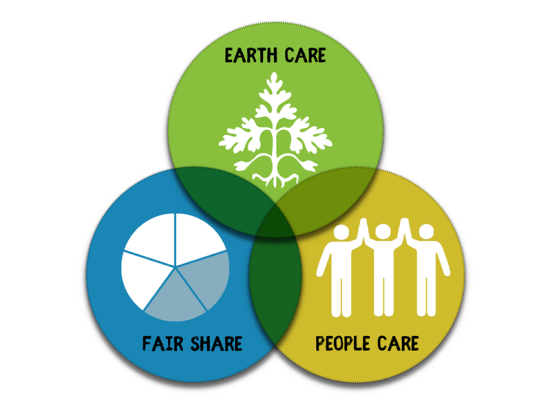Permaculture Ethics
The foundation of Permaculture is formed by its ethics – care of the earth, care of the people and fair share. Ethics are systems for moral values which give us a better understanding of good and bad outcomes. The Permaculture Ethics are not exclusively for people who share this specific philosophy but existed also in traditional communities and now in modern cooperative groups. They can be found throughout the world. In combination with the Permaculture Design they give us the chance to change the world to a more ecological and social place. We can establish these ethics in different places, for example in gardens, buildings, farms, communities, businesses and even in cities.

Care of the Earth
With caring of our earth, we are caring of all living and non-living things like animals and plants and their variety of species, soils, atmosphere, and waters. The earth gives us a livelihood that we have to protect instead of destroying. Protecting means respecting all forms of life in this world and reducing our unhealthy impact on the environment. We make daily choices of what we consume and conserve – starting with the choice of our clothes, the goods we buy and the material we use. All those decisions should consider the earth care.
Care of the People
As we are all living beings in this world, earth care also implies people care. It starts with selfcare, care for our family, our neighbours but also our community. It is important that we develop self-reliance and personal responsibility. Only thus we understand our value in the society and respect other people without exclusion or discrimination. Our basic needs for food, shelter, education, satisfying employment and social contact should be taken care of. Humanity, collaboration, and friendship can create a welcoming and cooperating community which people enjoy living in. Working and living in groups can be more efficient and bring the best outcomes.
Fair Share
Fair share means to contribute a surplus of food, time, money, or energy to other people who need that help. After fulfilling the own needs and designing the own system, it is most appropriate to support others in achieving their goals. Fair share is also synthesis of the first two ethics. We share our world with all living and non-living things and should consider that when we are act upon the nature. Furthermore, Permaculture rejects the concept of endless growth from the Global North and tries to design a fairer, more equitable world that considers the limits of the planet’s resources.
Sources
Holmgren, David (2002): Permaculture: Principles & Pathways Beyond Sustainability
Mollison, Bill (2011): Introduction to Permaculture
Permacultureprinciples.com: Permaculture Ethics
Permaculture – Earth Care, People Care, Future Care: What is Permaculture – Part 1: Ethics
About Us
Kukua Permaculture of Africa is a project to promote Permaculture all over Tanzania and Africa.
Social Media
Copyright 2024 – KPPA
